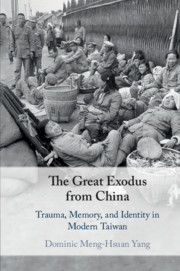Book contents
- The Great Exodus from China
- The Great Exodus from China
- Copyright page
- Dedication
- Contents
- Figures, Maps and Tables
- Acknowledgments
- Note to the Reader
- Abbreviations
- Maps
- Introduction
- 1 The Exodus
- 2 Wartime Sojourning
- 3 Cultural Nostalgia
- 4 The Long Road Home
- 5 Narrating the Exodus
- Epilogue
- Bibliography
- Index
Introduction
Published online by Cambridge University Press: 12 September 2020
- The Great Exodus from China
- The Great Exodus from China
- Copyright page
- Dedication
- Contents
- Figures, Maps and Tables
- Acknowledgments
- Note to the Reader
- Abbreviations
- Maps
- Introduction
- 1 The Exodus
- 2 Wartime Sojourning
- 3 Cultural Nostalgia
- 4 The Long Road Home
- 5 Narrating the Exodus
- Epilogue
- Bibliography
- Index
Summary
The Introduction starts off by drawing attention to the “memory boom” in contemporary Taiwan among the “mainlanders” – the elderly Chinese civil war exiles and their Taiwan-born children. The mainlander “memory boom” revolves around their traumatic expulsion from China in the mid-twentieth century, which had been suppressed for nearly half a century. It then introduces the book’s main argument – the great exodus serves as the collective “cultural trauma” for the mainlanders to reinvent themselves as deserving citizens of a democratized Taiwan. Next, the chapter provides a brief history of Taiwan. This is followed by an overview of Chinese civil war historiography. The historiographical discussion segues into a theoretical discussion that problematizes the “single event” model of both the psychoanalytic approach and the sociological approach to trauma and memory. The theoretical discussion offers an alternative model based on the multi-event trajectory of mainlander trauma. It makes a categorical distinction between the mnemonic “cultural trauma” and the substantive “social trauma.” The chapter then connects this new understanding of trauma and memory to theorizing diaspora, which underscores dispossessed people’s temporal displacement. The chapter ends with an assessment of the research and debate on mainlander identity formation in present-day Taiwan.
Keywords
- Type
- Chapter
- Information
- The Great Exodus from ChinaTrauma, Memory, and Identity in Modern Taiwan, pp. 1 - 39Publisher: Cambridge University PressPrint publication year: 2020

